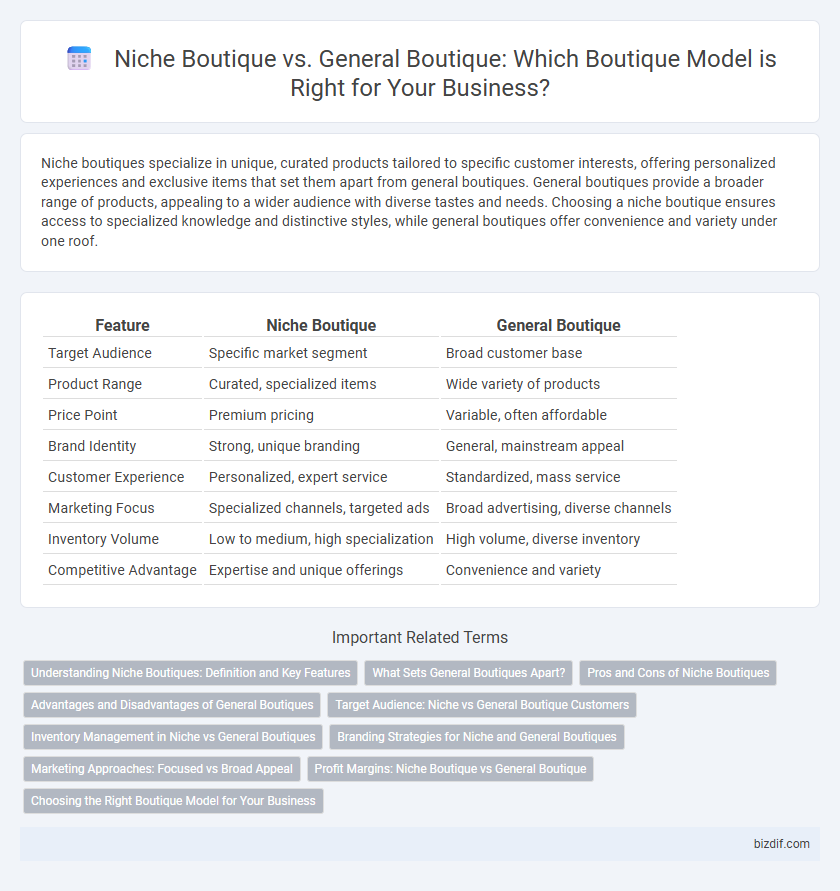Niche boutiques specialize in unique, curated products tailored to specific customer interests, offering personalized experiences and exclusive items that set them apart from general boutiques. General boutiques provide a broader range of products, appealing to a wider audience with diverse tastes and needs. Choosing a niche boutique ensures access to specialized knowledge and distinctive styles, while general boutiques offer convenience and variety under one roof.
Table of Comparison
| Feature | Niche Boutique | General Boutique |
|---|---|---|
| Target Audience | Specific market segment | Broad customer base |
| Product Range | Curated, specialized items | Wide variety of products |
| Price Point | Premium pricing | Variable, often affordable |
| Brand Identity | Strong, unique branding | General, mainstream appeal |
| Customer Experience | Personalized, expert service | Standardized, mass service |
| Marketing Focus | Specialized channels, targeted ads | Broad advertising, diverse channels |
| Inventory Volume | Low to medium, high specialization | High volume, diverse inventory |
| Competitive Advantage | Expertise and unique offerings | Convenience and variety |
Understanding Niche Boutiques: Definition and Key Features
Niche boutiques specialize in a specific category, product type, or target market, offering unique selections that cater to particular customer preferences and trends. These boutiques prioritize curated inventory, personalized customer service, and specialized expertise to create a distinctive shopping experience. Unlike general boutiques, which provide a broader range of products, niche boutiques focus on depth and exclusivity within their chosen segment.
What Sets General Boutiques Apart?
General boutiques distinguish themselves by offering a broad selection of products that cater to diverse customer preferences, unlike niche boutiques that focus on specialized segments. They often stock a mix of apparel, accessories, and home goods, appealing to a wider market with varied styles and price points. This diversity allows general boutiques to attract a larger customer base and adapt quickly to changing fashion trends.
Pros and Cons of Niche Boutiques
Niche boutiques specialize in targeted product categories, offering unique, high-quality selections that attract a loyal customer base and reduce direct competition, enhancing brand identity. However, their limited inventory scope can restrict market reach and scalability compared to general boutiques, which offer a broader product range appealing to diverse customers but may lack distinctiveness. The focused approach of niche boutiques allows for personalized customer experiences and expert knowledge, yet it requires precise market understanding to avoid niche saturation or demand fluctuations.
Advantages and Disadvantages of General Boutiques
General boutiques offer a wide product range appealing to diverse customer needs, enhancing foot traffic and potential sales volume through variety. However, their broad inventory may dilute brand identity and reduce the ability to provide specialized expertise or personalized service compared to niche boutiques. Managing a general boutique involves higher operational complexity and inventory costs, impacting overall profit margins.
Target Audience: Niche vs General Boutique Customers
Niche boutiques attract a specific target audience seeking unique, specialized products tailored to their distinct tastes, often valuing exclusivity and personalized shopping experiences. General boutiques cater to a broader audience by offering a wide range of trendy, accessible items that appeal to diverse customer preferences and shopping habits. Understanding the target audience helps niche boutiques build strong brand loyalty, while general boutiques emphasize variety and convenience to capture mass market appeal.
Inventory Management in Niche vs General Boutiques
Niche boutiques excel in inventory management by curating a focused selection of specialized products that cater to specific customer preferences, reducing overstock and improving turnover rates. General boutiques manage a broader inventory range, requiring more complex tracking systems to balance diverse product categories and avoid stockouts or excess. Advanced inventory software tailored to boutique size and specialization enhances accuracy, optimizes stock levels, and supports data-driven purchasing decisions in both niche and general boutique settings.
Branding Strategies for Niche and General Boutiques
Niche boutiques capitalize on branding strategies that emphasize specialized, unique product offerings and cultivate a deeply engaged target audience through personalized storytelling and exclusive experiences. General boutiques adopt broader branding approaches, focusing on wide appeal, diverse product ranges, and consistent brand messages that attract a larger, more varied customer base. Effective branding for niche boutiques often involves community-building and authenticity, while general boutiques prioritize visibility, accessibility, and competitive pricing to enhance market presence.
Marketing Approaches: Focused vs Broad Appeal
Niche boutiques employ targeted marketing strategies that concentrate on a specific customer segment, using customized messaging and specialized channels to build strong brand loyalty and higher conversion rates. General boutiques utilize broad appeal marketing tactics, leveraging mass media and diverse product offerings to attract a wide audience and maximize overall reach. Effective marketing for niche boutiques often involves influencer partnerships and community engagement, while general boutiques prioritize extensive advertising campaigns and seasonal promotions.
Profit Margins: Niche Boutique vs General Boutique
Niche boutiques often achieve higher profit margins by targeting specialized markets with unique product offerings, allowing for premium pricing and customer loyalty. General boutiques rely on broader inventory, facing increased competition and thinner margins due to price sensitivity and less differentiation. Strategic focus on niche markets enhances profitability through reduced price competition and stronger brand identity.
Choosing the Right Boutique Model for Your Business
Niche boutiques cater to specific customer segments by offering specialized products, allowing for targeted marketing and higher customer loyalty. General boutiques provide a diverse product range appealing to a broader audience but face intense competition and higher inventory costs. Selecting the right boutique model depends on market research, customer preferences, and business goals to maximize profitability and brand differentiation.
Niche Boutique vs General Boutique Infographic

 bizdif.com
bizdif.com